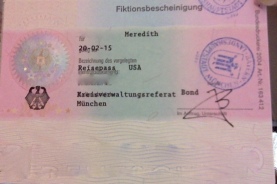Officially a Resident
It is only my 5th day since arriving in Munich, and I am proud to say that I already have my residence permit! This is a great big multi-step bureaucratic hurdle that I crossed in one jump — despite the jet lag — on my first full day here.
After a proper German breakfast (read: long and relaxed), we headed to the Munich Kreisverwaltungsreferat (KVR). This is a local government office that deals with citizens’ issues like drivers licenses, hunting and fishing licenses, IDs, passports, birth and marriage certificates, name changes, elections, and (among many other things) immigration. It is an enormous place!
Our first stop was the Bürgerbüro — the citizen’s office — where you register with the city upon first arrival. We got there late morning and the place was already packed, so we pulled a number and, seeing that we had a while to wait, went next to the Ausländerbehörde — the foreigners’ registration office. We walked up to the counter, told the lady that I was there for a residence permit, she checked over my documents and then told me what we already knew: I needed to register (anmelden) with the city first. Still, she handed me the necessary application form and confirmed that I had all of the needed documents with me.
Back in the Bürgerbehörde, we filled out forms, waited for my number to be called (about 3 hours total), played tic-tac-toe and did some people watching as they were called in and out of the four offices there. I eventually timed the numbers as they ticked by — from 160 to 170 in about 14 minutes — and reckoned it would take at least another hour to get to number 204. We should have brought books to read!
The people watching was interesting though. Everyone needs to go to the Bürgerbehörde at some point or another, and Julius noted that it’s a kind of equal opportunity experience. Unless you’ve got a baby or a physical disability, you’re going to be there a really long time. So we saw chic Munich mommies, some guys who looked like junkies, families with rambunctious kiddos, old ladies and young business men, other foreigners — and everyone had to take a number and wait.

“Stempel,” CC 2013 by Christian Schnettelkeller, http://www.manoftaste.de
The place closes at 3 PM on Thursdays, but a sign by the number ticker assured that if you had a number, you would be seen that day. Finally, around 2 PM, I was called up. I simply handed them the form I’d already filled out, waited for them to punch some data into the computer, then was given a print-out with a stamp on it (Germans love stamps! They make everything official.) … and I was done! It took 2 minutes.
So, once I was officially registered with the city of Munich, I took my stamped paper back to the Ausländerbehörde. I was hoping to just get an appointment for another day, but they said they could take me!
Luckily, the place was almost empty. I was given number 24, and they were already on 22. When I was called back, I handed him all the needed documents: the application form, the marriage license, my passport, the registration paper I’d just received, a standard passport photo, and proof of German skills (TestDAF results). And my husband with his ID — that was also needed. I was sent back out of the office while the worker processed my information, then called back in to give fingerprints. Then I was sent to pay for the thing (110 €) and had to return to the office with the receipt, then go back to the cash register to pick up the permit, where it was printed.
It was just after 3:00 PM, and there I had it in my hands, a residence permit good for three years! … Actually, it is just a temporary paper copy. The real thing (elektronische Aufenthaltstitel) is coming from Berlin in a few weeks. It will have my picture on it and contain a chip that has fingerprint data, etc. Along with allowing me to reside in Germany, the residence permit also entitles me to work here. It seems that once a person is here, they want them to get to work. I really appreciate that I don’t have to go through a separate application process for a work permit. It will be difficult enough for me to start a career here, but at least I am easily permitted to do so!
Tips for others who are coming to Germany:
- Getting to the München Kreisverwaltungsreferat: U-6 Poccistraße, at Rupperstraße 11 & 19, 80337 München. Here it is on a map. There are plenty of places to park a bicycle outside.
- You can do the Anmeldung (registration) by post, saving you a trip to the KVR. If you aren’t interested in getting everything done on your first day in Germany, you can print out the form [download here] and receive confirmation in the mail about 2 weeks. As soon as your registration confirmation, you could contact the Ausländerbehörde for an appointment for your residence permit. Move info about registration here.
- If you are showing up to do it in person, come early, as soon as the KVR opens. The schedule for Munich KVR is here.
- For your residence permit appointment, have all documents on hand. When you call to make the appointment, check and double check that you have an accurate list of needed documents. I came to Germany on the grounds of Familiennachzug (moving to be with family), and the information and forms about that is available here. If you are coming to work or to study, there will be a different list of requirements. Just in case, bring every important document you have in a big folder. For the Anmeldung, I needed to know the dates of my previous stay in Germany. Luckily, I had my An- and Abmeldung statements from last time in my handy-dandy folder! Documents from your home country, like birth or marriage certificates, should have an Apostille. Get these before you come, if possible!
- Be prepared to wait. Bring some entertainment (book, fun person, crossword puzzle) and snacks!
- In the Bürgerbehörde, if you have a special need, i.e., are pregnant or have an infant or any kind of physical challenge, you get to knock on a special door and jump the line significantly. That’s great! We did wonder of some people brought their small children just so that they could jump the line though… not sure if that’s how the system is intended to work.
- For US Americans: We can come to Germany without a visa and stay as a tourist for up to 90 days. Within those 90 days, it is very possible to complete the application process for a residence permit. You can also take care of it in one of the German consulates in the US before you come, but that is not necessary. After my one experience at the consulate in Atlanta, I was not eager to go back. It’s hard to get an appointment!
If you are reading and have been through the process before, what tips can you share? If you are preparing to come, what questions do you have? If you are just a family member or friend with no plan to move to Germany, what do you think? Is this boring to you? I’ll be mixing it up between informational posts and stories on the blog from now on.
*Disclaimer: All blog posts and especially these tips are based on my personal experiences and reputable sources I’ve found on the world wide web. They are meant to be a resource for anyone who reads them, but I cannot guarantee that the information does not contain factual errors. In no way do I represent the Landeshauptstadt München (state capital Munich), Freistaat Bayern (the state of Bavaria), or Bundesrepublik Deutschland (Federal Republic of Germany), other than as a resident. For the most accurate information, contact the city/government office responsible for matters in your area.


I think it’s wonderful information- regardless of the fact it’s not pertinent to me. You’re wonderful with words, mere!
LikeLiked by 1 person
So ein bürokratisches Verfahren ist anstrengend, zeitraubend und nervig. Aber du hast trotzdem Glück. Viele kommen nach München, wollen arbeiten und dürfen nicht. Weil sie Flüchtlinge oder Asylanten sind, weil sie keinen Deutschtest bestanden haben, weil sie keine ausreichende Ausbildung haben usw.
LikeLike
Thank heaps!
LikeLike
Pingback: honeymoon in dresden | internationally engaged